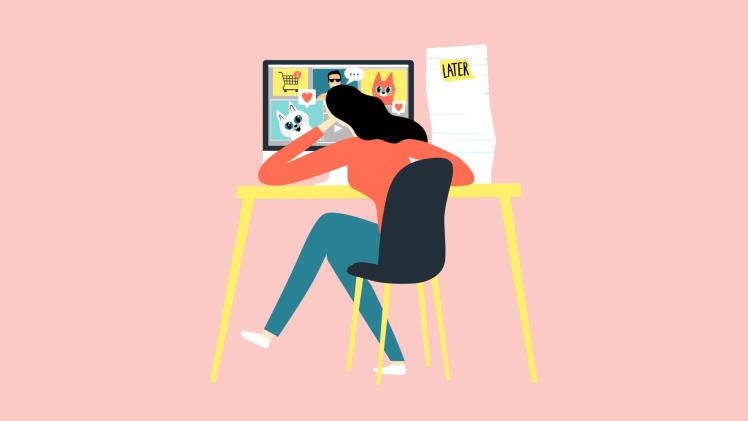When we think of ourselves in the future, our brain activity is the same as when we think of strangers. In other words, our brain, unless specially trained, does not understand our future self and is tuned only to the present.
From this point of view, procrastination is not even a psychological phenomenon, but a biological one. Why should we work hard now so that some incomprehensible character would feel better in the future? No. We will, perhaps, relax as we should, and tomorrow let this obscure character take the blame for us.
So that’s the rule:
We are biologically conditioned to receive a concrete and immediate positive result. And someone else will suffer from the consequences of the choice in favor of this result, from the point of view of the brain, but not us.
Okay, the problem is clear. We procrastinate because that’s how our brain works. And these techniques will help us deal with it.
Changing Our Mindset
Picture the situation. You have long been going to start exercising – for example, do exercises in the morning. And you can’t even find an excuse not to start. The truth is it is not difficult to devote 10 minutes a day to easy exercises.
But here comes another morning. What kind of attitude do we give ourselves? “I’m going to start exercising, but not today.” There is immediate relief – tomorrow someone else will deal with it, and for today, we have agreed with ourselves. And what happens tomorrow? It’s about the same, only every day the burden of unfulfilled promises is added. The guilt of realizing that you haven’t started again is growing. It turns out that we begin to swing more and more every day on these emotional swings.
And what’s a good attitude to use instead of “I’ll start exercising, but not today”? This one: “I’m not going to start exercising.”
Changing your mindset doesn’t help you not to procrastinate. But it does help to gradually remove the guilt of self-given and unfulfilled promises. As the guilt diminishes, your amount of strength will increase.
Taking Choices Away From the Future Self
This method works great in little things. The little things done right help form the habit of doing the right thing in general. Let’s explain with examples.
In the morning, you have to finish the report and not be distracted by mail? Lock your computer, closing your email beforehand and leaving the report open.
Need to stop eating too much at night? Stop buying food in advance. Take exactly as much as you need for your dinner. Then for a night snack, you will not just need to open your fridge, you will have to go to the store. As a result, controlling yourself will be much easier.
Need to work all day without getting distracted by more pleasant but less profitable things, like chatting with your friends or playing at 22Bet? Install an app that blocks selected sites for a few hours.
Teach Your Brain That Its You in the Future
There are several ways to gradually train your brain:
- Look at your artificially aged face.
- Write a letter to yourself to open in a few years.
Try estimating deadlines differently. “In three years,” sounds about like “never.” But “In 156 weeks” or “In 1,095 days” sounds closer to reality. It is easier for us to imagine many short periods of time than one big one.
All of these ways should be used regularly, not just once each time. Single use is useful to get a lot of work done with a lot of desire, from which you won’t get a quick return. And regular use will help realign your brain – and, if not remove procrastination cravings completely, at least weaken them greatly.
Use Procrastination Cravings to Your Advantage
We choose what gives us pleasure right now, even if there are negative consequences. What can be squeezed out of this rule? A lot. Again, let’s look at examples.
You decided to exercise to lose weight and tighten your stomach. All analyzed and realized that the best option – running. But you still can’t stand running since school. But running will give results after just three months. What to do? Remember that these three months you still have to last – working on the result of the outsider, from the point of view of your brain. Look at other options. For example, there’s yoga, which will give such a result in six months at best, but you like stretching and smooth movements. In this situation, choose yoga.
You need to make a monthly plan for the amount of work you do. Doing the plan is good; they give you a bonus for that. But they don’t sum up the results until the end of the month. So you can take it easy today. Try to set yourself small deadlines. For example, in a month you have to handle 3,600 requests. That means you have to process 180 per day. And already it becomes clear, every day you are well done or not. And if you process 190 requests each day, on the last day, you can do nothing all day.
Summary
Procrastination is not only a psychological phenomenon, but also a biological one. Our brain, unless specifically trained, treats our future self as an outsider.
To defeat procrastination, we need to go in two directions: train our brain and form useful habits.
To train your brain, change attitudes and find ways to look closely at your future self and the time frame that separates you from that future self.
To form useful habits, leave the future self as little opportunity as possible to do something wrong, and choose ways to achieve your goals that are more enjoyable in the process.

